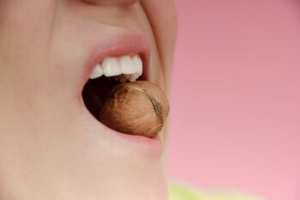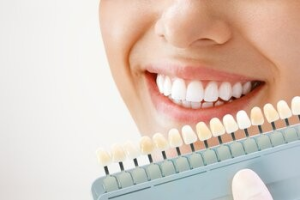Are you experiencing tooth pain or sensitivity? You may have a cracked tooth! Cracked teeth can be tricky and unpleasant, but understanding the symptoms is key to getting the appropriate dental care. This blog post explores all the details on what to look out for when it comes to cracked tooth symptoms – from spotting early signs of a crack, types of cracks, and other ailments that could be causing your oral discomfort. Keep reading if you want comprehensive advice on identifying a fractured tooth and getting it diagnosed!
Cracked Tooth Diagnosis
If you suspect your tooth is cracked, don’t wait for the pain to elevate before seeking professional assistance. In this article, we’ll provide you with the signs and symptoms of cracked teeth and the best ways for your dentist to diagnose them.
Pain while chewing
One of the most common signs of a cracked or split tooth is a sharp pain while chewing or biting down. The pain is usually felt when you release the pressure on the tooth. It may be sharp or dull and may come and go. This pain can be quite intense and even cause headaches. If you experience this pain, seeing your dentist as soon as possible is important, as it suggests the crack could be deep.
Sensitivity to hot and cold temperatures
Another symptom of a cracked tooth is sensitivity to hot or cold food or drinks. Ice cream or hot soup can trigger a sudden and sharp pain that quickly disappears. This happens because the crack in your tooth exposes the nerve endings, which can cause discomfort and pain. This can indicate a tooth crack that needs your dentist’s attention.
Swelling and tenderness
Pain is not a precursor to cracks in some cases. You may have pain-free cracks that only exhibit tenderness and swelling in the affected area. Although these signs may not be apparent, they indicate that the crack has extended into the underlying soft tissue, requiring immediate dental attention.
Chipped teeth
Sometimes a small piece of the tooth may chip away, exposing the pulp and nerves below the surface. You may have sustained this chip by biting down hard, grinding your teeth, or simply through wear and tear of the tooth over time. This is a clear indication of a crack and should be checked out by your dentist as soon as possible to assess the seriousness of the situation.
Visible cracks
A visible crack may appear as a line on your tooth or be more obvious and extend down the tooth. These visible cracks are a sign to seek immediate dental care quickly as they indicate a deep fracture within the tooth, potentially leading to an abscess or other serious complications.
The Most Common Causes of a Cracked Tooth
Unfortunately, several factors can lead to cracked teeth. Some are avoidable, while others are not. In this section, we will look at the most common causes of cracked teeth and what you can do to prevent them.
Biting on hard substances
One of the leading causes of a cracked tooth is increased biting pressure while consuming substances like ice, hard candy, and nuts. Biting down hard on these substances can weaken or damage the tooth structure over time. Gradual deterioration of the tooth structure can eventually lead to a tooth fracture. It’s best to avoid biting down on extremely hard substances to prevent tooth damage.
Tooth grinding
Bruxism, commonly known as tooth grinding, can cause cracks in your teeth, especially if you grind your teeth at night or during times of stress. Bruxism can lead to jaw pain, headaches, and toothaches, and it should be treated to prevent tooth damage. Speak to your dental consultant about wearing a mouthguard if you have a tooth-grinding habit at night. This will safeguard your teeth from further damage.
Trauma to the mouth
Most cracked teeth are caused by traumatic injury to the mouth. Accidents, sports injuries, or falls can cause cracks, chips, or vertical root fractures in your teeth. Trauma should be addressed quickly to prevent the tooth from becoming infected or damaged. A dental crown or bridge may sometimes be needed to repair the damage.
Ageing
Our teeth become weaker and more brittle as we age, making them more susceptible to tooth fractures and cracks. Bone loss, receding gum line, and weakened tooth enamel can all make your teeth more prone to damage. Regular dental check-ups and a healthy diet are essential for oral health as you age.
Temperature changes
Drastic temperature changes can cause cracks in your teeth. For example, drinking a hot beverage and then quickly following with a cold drink can cause your teeth to contract and expand. This can lead to cracks, chips, and even vertical root fractures. Avoid consuming extremely hot or cold substances back to back to prevent tooth damage.
Treatment For a Cracked Tooth
This blog section discusses the different treatment options for cracked tooth syndrome and their benefits. So, let’s get started!
Composite bonding
Composite bonding is a procedure where a tooth-coloured resin material is used as a dental filling in cracks or gaps in the teeth. This procedure is relatively affordable and can be completed in just one dental visit. Composite bonding is also useful if you have chipped teeth or minor dental work that needs to be done. However, you must be careful when eating hard or sticky foods, as they could destroy the bonding.
Crowns
If your cracked tooth is severe, a crown may be recommended. A dental crown is a tooth-shaped cap adjusted over the damaged tooth. This will restore the tooth’s function and give it a more natural look. The process involves removing part of the tooth, taking an impression of the tooth, and then placing the crown over the tooth. Crowns are long-lasting and durable, making them suitable for cracked teeth.
Root canal treatment
If the crack in your tooth has extended to the dental pulp, you may require a root canal. A root canal involves removing the damaged pulp, cleaning the root canals, and filling them with dental material. This process helps to remove any infection that may have developed and prevent further damage. After the procedure, a crown is usually placed over the tooth to add protection and restore its natural look.
Tooth extraction
In severe cases where the tooth is beyond repair or poses a risk of infection, extracting the tooth may be the only option. After the tooth is extracted, dental implants, dental bridges, or dentures may replace the missing tooth. Although this option may seem daunting, getting proper treatment to prevent further complications is essential.
Veneers
Veneers are a lean layer of porcelain that is adjusted over the tooth to enhance its appearance. It can also be used to cover up small cracks and chips. The process involves removing part of the tooth and placing the veneer over the tooth. Veneers are a suitable option if you want to improve the look of your smile, but they are not recommended for severe cracks.
Prevention Tips for Avoiding Further Damage to Your Teeth
In this blog section, we’ll provide some helpful tips on avoiding further damage to your teeth and maintaining your oral health.
Avoid teeth grinding
If you have a habit of teeth-grinding during sleep or while awake, it can cause severe damage to your teeth. When you grind your teeth, you apply a lot of pressure, which can cause them to crack or even break. You can prevent further damage by seeing a dentist to diagnose your problem and provide the necessary treatments, such as a mouthguard.
Daily brushing and flossing
Brushing and flossing your teeth regularly is fundamental to keeping good oral hygiene. Poor oral hygiene can cause cavities and tooth decay, leading to more serious issues like broken or chipped teeth. When brushing, remember to use a soft-bristled toothbrush and fluoride toothpaste.
Avoid hard and chewy foods
Hard and chewy foods like ice, popcorn kernels, and hard candy can cause damage to your teeth. You may not even know it, but chewing on pen caps or biting your nails can also result in broken teeth. Cut down on these foods; if you must have them, chew them at the back of your mouth.
Quit smoking
Smoking is damaging to your overall health, including your teeth. It causes many dental problems, such as periodontal disease, bad breath, and stained teeth. It can also cause tooth decay and gum disease, leading to broken or chipped teeth. Quit smoking today for a healthier mouth and body as a whole.
Visit your dentist regularly
Regular dental check-ups are essential for your oral health. It would help if you visited your dentist at least twice a year to get your teeth checked and cleaned. Your dentist can diagnose oral health issues such as gum disease, cavities, and other underlying medical conditions leading to damaged teeth. Early detection through proper examination of dental history helps prevent further damage to your teeth.
Conclusion
Tooth cracks can be a very serious condition, even beyond just the discomfort of pain and sensitivity to temperature. Therefore, being aware of their symptoms is an important step for any dental health-conscious person. Remember, if you start to experience any of these common cracked tooth symptoms, you must immediately contact your dentist for a professional evaluation and treatment. If you feel you may have the symptoms of a cracked tooth, don’t hesitate to reach out and contact us at (02) 9171 0840 today. We are here to help keep your smile looking and feeling its best – it’s our passion! Your oral health matters more than you think, so let us help guide you to optimal dental health!
References
https://www.colgate.com/en-us/oral-health/cracked-tooth-syndrome/what-to-know-about-a-cracked-tooth
https://www.healthline.com/health/cracked-tooth

